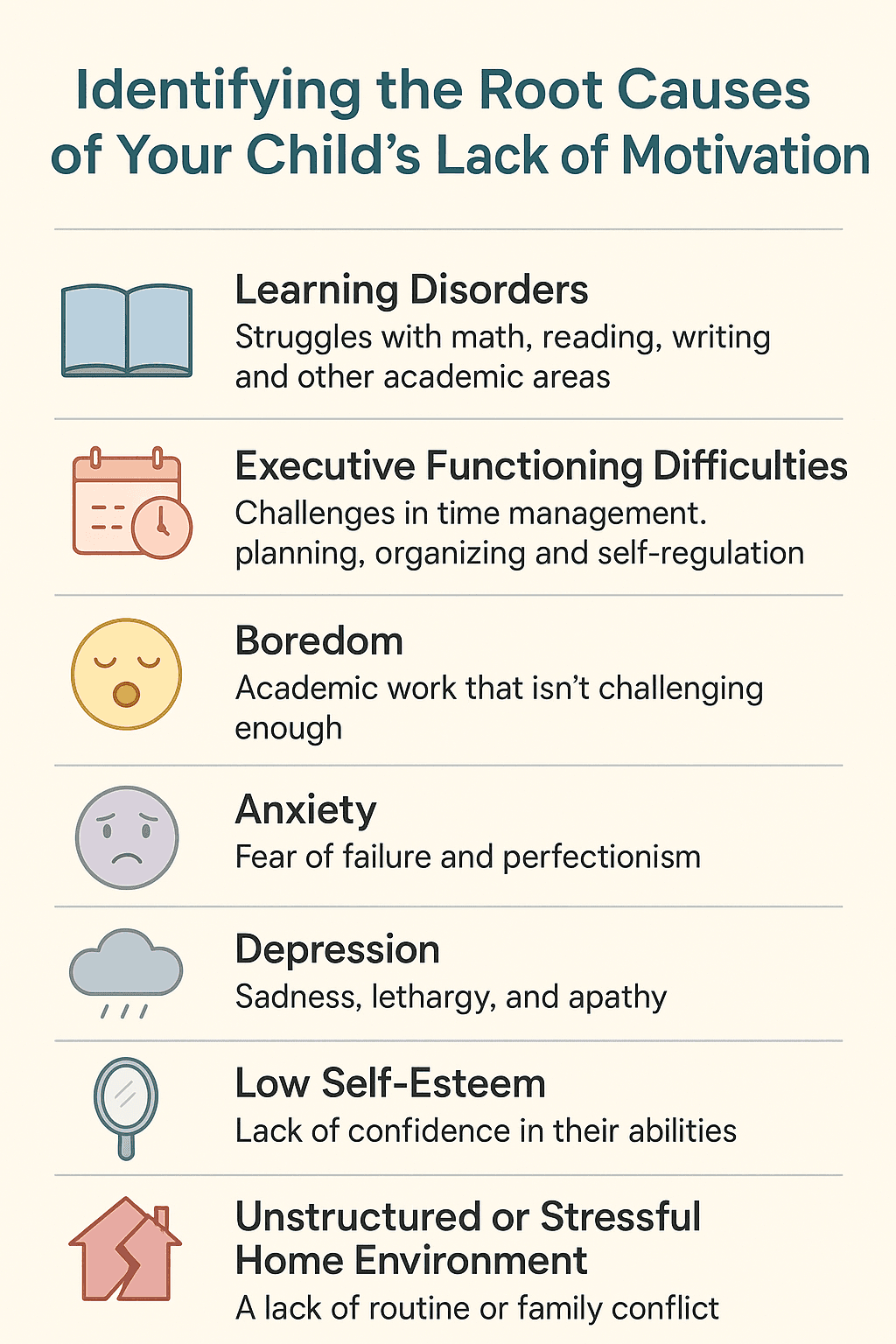How To Motivate a Child Who Seems Lazy
Struggling with a child who seems unmotivated? Learn how to identify the root causes — like learning issues, mental health challenges, or low self-esteem — and discover proven strategies to reignite your child's drive with structure, support, and accountability.


Kids of all ages sometimes struggle with motivation. If you're having difficulty getting your child to complete their homework or household duties, you may worry that your child's lack of motivation could worsen as they grow older. By determining what may be hindering your child's desire to succeed, you can address these concerns and help them regain their drive to excel.
Key Takeaways
- Every child is motivated by something, even if it appears they aren't achieving much.
- Many things can contribute to a child's lack of motivation, including learning disorders, self-esteem issues and mental health challenges.
- By understanding what is getting in the way of your child's motivation and fostering accountability for their actions, you can enhance their drive to succeed.
How to identify the root cause of your child's lack of motivation
While everyone occasionally struggles with motivation, it can be particularly challenging when your child constantly seems to slack off. Every parent wants the best for their child, and no one wants to see their lack of motivation become a long-term issue as they grow older.
While some children may struggle to see the importance of completing homework or chores, there can also be other underlying causes for their lack of motivation. These causes may include:
- Learning disorders - Struggles with math, reading, writing and other academic areas can lead to frustration, impacting motivation.
- Executive functioning difficulties - Challenges in time management, planning, organizing and self-regulation can make it difficult to focus, resulting in feelings of inadequacy.
- Boredom - Some children may become disengaged if their academic work isn't challenging enough, impacting their motivation to complete assignments.
- Anxiety - Fear of failure and perfectionism can prevent children from engaging in activities or trying new things.
- Depression - Sadness, lethargy and apathy are symptoms of depression that can significantly affect your child's motivation and desire to engage in activities.
- Low self-esteem - If your child lacks confidence in their abilities, they may hesitate to put forth effort in their studies.
In addition, your home environment may also affect your child's lack of motivation. Children who grow up in an unstructured environment or face stress and conflict within their family dynamics may feel less motivated to complete tasks.

Effective ways to motivate a lazy child
Motivation is what drives us, even when we face challenges. You can inspire motivation in your child by supporting their efforts in various ways, such as setting expectations, using positive reinforcement and modeling the behaviors you wish to see in them.
Set clear and realistic expectations
Your child must clearly understand what is expected of them in order to establish their responsibilities. Be sure to talk to them and explain exactly what you expect. If you want your child to fold a load of laundry and sweep the kitchen when they come home from school, inform them beforehand. If they are unsure how to complete these tasks, show them how. You should also implement consequences if they do not finish their chores on time.
Use positive reinforcement & rewards
Positive reinforcement is known to help encourage appropriate behaviors and skills in children and adults. Praising your child when they attempt to complete their tasks boosts their self-esteem and motivates them to continue. You may also consider rewarding them if they consistently demonstrate these behaviors.
Encourage independence & responsibility
While your child may require occasional reminders of their responsibilities, you should encourage them to stay accountable for their actions. Allowing them to face the natural consequences of not completing chores or submitting homework on time can help them develop the self-reliance they will need as adults.
Use apps or technology
Many types of apps can motivate your child in various areas of life. Some apps allow you to assign your child different chores to complete, and as they finish each task, they can level up or earn rewards. These apps can also encourage your child by visually showing how much they have accomplished.
Meet them where they are
If your child still struggles to stay motivated to complete their work, ask them what challenges or concerns they have. Fear of failure and learning difficulties can be the root causes of your child's issues. By trying to understand their perspective on the situation, you can work collaboratively to find solutions that enhance motivation.
Make learning and tasks more engaging
If you suspect that boredom affects your child's drive, try to make these tasks more engaging. For example, you might suggest they listen to music while doing household chores or break larger homework assignments into smaller sections, taking a break every thirty minutes to recharge. These tips can help make boring or overwhelming tasks more manageable and easier to accomplish.
Be a role model for motivation
Children often imitate their parents' actions, regardless of whether they are good or bad. If you want to encourage your child to take on more responsibility for their household chores or homework, allow them to observe you completing your daily tasks. After all, you can't expect your child to finish their chores promptly when they see you neglecting your responsibilities.

Begin your journey with an intake session
Learn more about therapy, medication, or other options and determine the best next step through a personalized clinical session with a licensed clinician.
Overcoming common challenges with lack of motivation
Everyone has a motivation that drives their actions and inactions. By addressing common challenges to motivation, you can effectively address resistance and excuses while also helping your child if they seem stuck and unable to finish their work.
How to deal with resistance and excuses
Dealing with someone who's full of excuses can be extremely frustrating. However, yelling and fighting will not solve the problem. Instead, remain calm and clearly state what you want them to do with phrases such as, "I want you to clean your room now." Then, leave their room. If your child doesn't do it within your specified time frame, follow through with your consequences.
What to do if your child seems stuck
Sometimes, children want to begin or finish a task but seem unable to move beyond a certain point. If your child seems stuck, talk to them and ask what is getting in their way. If they are fearful, you may share a time when you experienced similar feelings.
You can also brainstorm a few ideas with your child to help them conquer their fears and complete the assignment or chore. While you may offer to help your child get started, back off as they begin to show mastery. This can improve their confidence and increase their motivation to finish.
When to seek professional help
Some children may appear unmotivated but are struggling with a language disorder, learning disorder or difficulties with executive functioning. Mental health challenges can also significantly impact your child's motivation.
If you suspect your child is struggling, it may be time to seek professional help. Emora Health can help you find a qualified therapist to address your child's lack of motivation. Therapy offers a nurturing space for your child to express their feelings and address their worries and concerns.
Working with a compassionate counselor can help them overcome emotional and mental health issues, enhance their performance at school and improve their behavior at home. Begin your search for a qualified mental health professional today.





